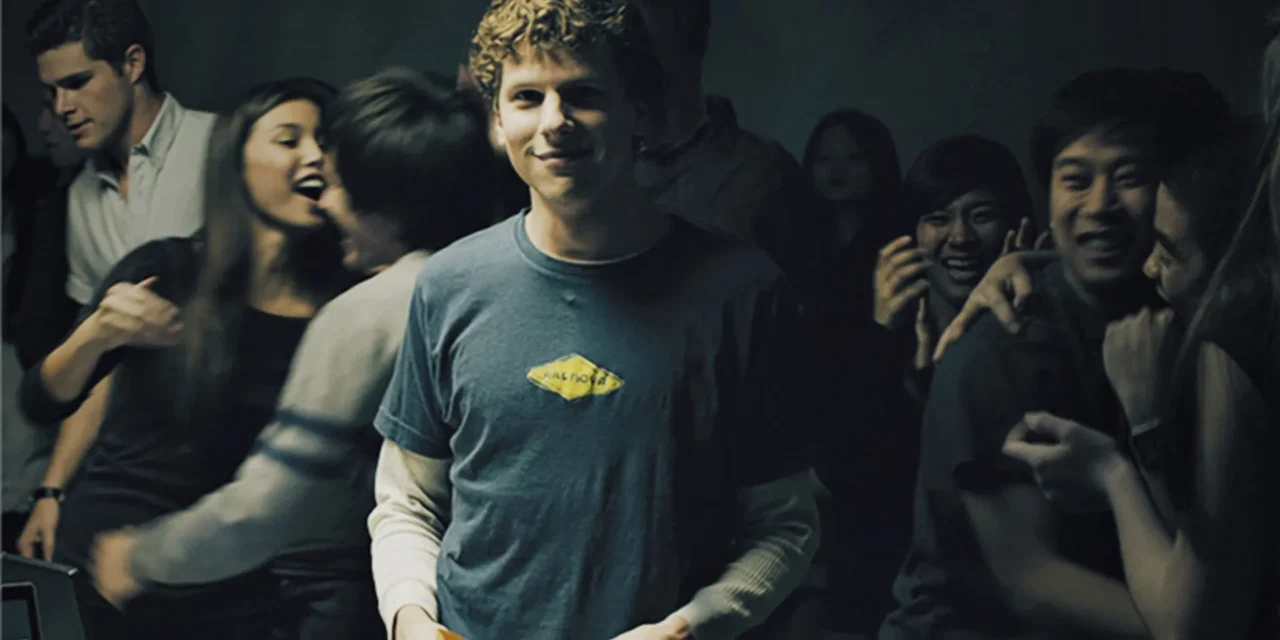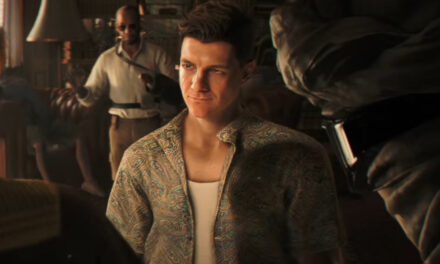On October 1, 2010, The Social Network opened nationwide and became an instant classic in the process. While a movie about the founding of Facebook might not seem like a nailbiter, director David Fincher and screenwriter Aaron Sorkin presented the story with a sense of urgency that allowed the film to work beyond being a look into how Facebook came to be. At its heart, it’s a story about friendship, betrayal, and greed that culminates in not only one of the best films of the year it was released, but also a true masterpiece of the 21st century.
Directed by Fincher from a screenplay by Aaron Sorkin, The Social Network is based on the 2009 book The Accidental Billionaires by Ben Mezrich. The movie chronicles how the social networking website Facebook came to be and follows its founder, Mark Zuckerberg (Jesse Eisenberg), as the film is intercut between two depositions, which see Zuckerberg being sued by his former best friend, Eduardo Saverin (Andrew Garfield), and twins Cameron and Tyler Winklevoss (both played by Armie Hammer).
As these depositions play out, the film bounces back and forth in time to showcase how Facebook was formed out of Harvard University and the players involved, who believed that the idea was their own and something stolen by Zuckerberg. The film also stars Justin Timberlake, Max Minghella, Brenda Song, Rooney Mara, Joseph Mazzello, and Rashida Jones.
The Social Network is the perfect marriage of director and screenwriter. Fincher was already considered one the best directors working in the industry before The Social Network, thanks to films such as Se7en, The Game, Fight Club, Zodiac, and The Curious Case of Benjamin Button, and Sorkin was already one of our most celebrated writers thanks to his work in film (A Few Good Men) and television (The West Wing).
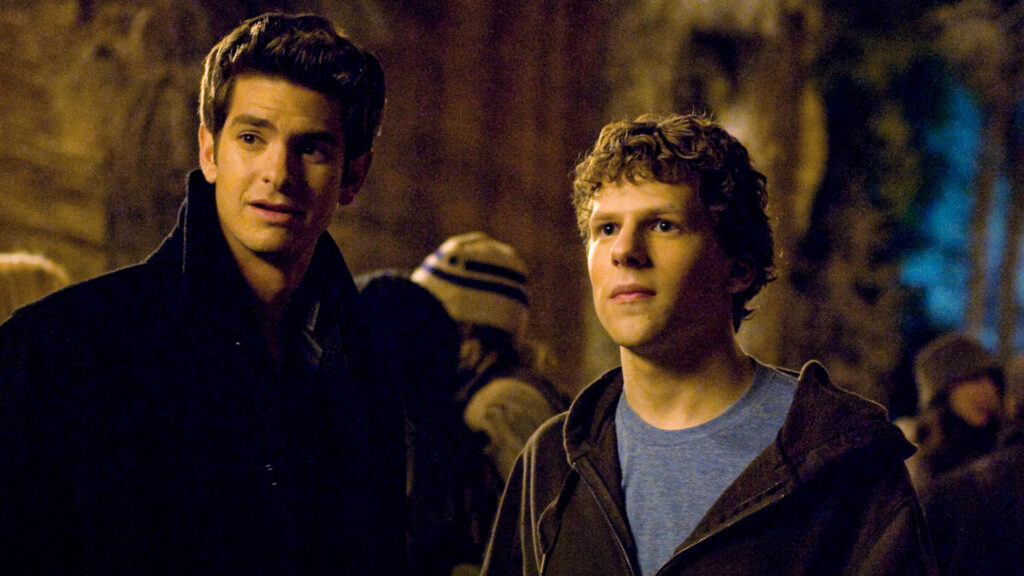
There is a link in their work in The Social Network that represents an understanding of what the film should’ve been from the start. In the years since The Social Network was released, a lot of emphasis has been put on what was true about its story and what was embellished, but the smart move made by Fincher and Sorkin was toying with the line between fact and fiction. The bare bones of the story are established in truth (Facebook emerged out of Harvard University), but the details didn’t need a sure footprint of accuracy. The tension that comes out of the film is the unknown.
Is Zuckerberg’s side of this true? Was Eduardo shafted out of something he helped create? Was Zuckerberg as neurotic and underhanded as the film lets on? The movie lets the audience come to its own conclusions by the time the film’s credits begin to roll. Perhaps, as they say, the truth lies somewhere in the middle.
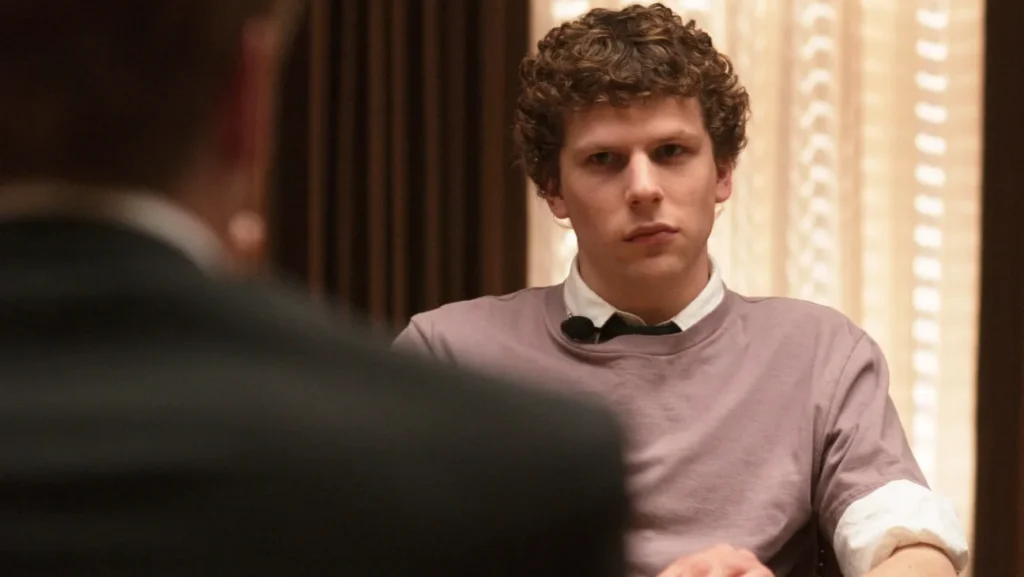
Sorkin has said that the creation of Facebook wasn’t what drew him to the story, but it was the themes of “friendship, loyalty, jealousy, class, and power” that attracted him the most. A movie solely about the invention of Facebook wouldn’t be interesting, but once you throw in the classic storytelling tropes of friendships torn apart due to betrayal and jealousy, then you have a meaty story worth telling. This could be why The Social Network resonated with the target demographic when it was released. I was twenty-five years old when the film opened in theaters, and I can only imagine that it spoke to an audience that was a few years younger than me because they could identify with its themes of bonds that could be so easily undone.
There are many young adults out there hoping to be entrepreneurs as they embark on the next big idea, and sometimes that idea is formed with a close friend. The belief is that there is a level of trust going into such endeavors because the friendship has already been solidified, and that should be able to transition into business. Sadly, it’s often said that it’s best not to mix friendship with business, and The Social Network drives that notion home. This is one of the big reasons the film spoke to the audience. Some have either already found themselves in a similar situation, or they were thinking about doing so.
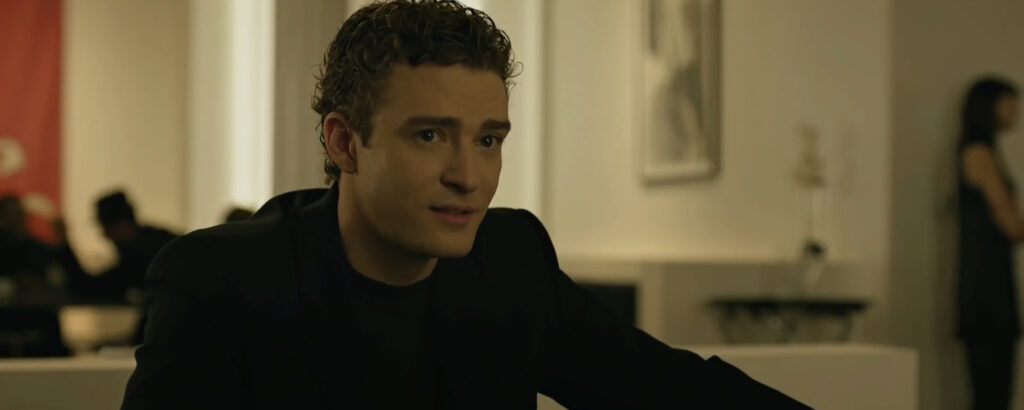
Either way, The Social Network is a blistering cautionary tale that rightfully doesn’t make one person the source of blame when it comes to the betrayal. Some might be at fault more than others, but nearly every character involved does something questionable as the idea of Facebook grows larger and becomes more of a lucrative reality rather than a pipe dream born out of resentment and jealousy in a dorm room.
The decision of Sorkin to begin the film with Zuckerberg being dumped by his girlfriend Erica Albright (Mara) proves to be a wise one. While Erica is a fictional character made for the movie, the heart of the situation (the event of a breakup) did inspire Zuckerberg to create Facemash, which was the humble beginnings of Facebook. The film needed a name and face to put to this breakup, and Sorkin’s dramatization of Erica, combined with Mara’s performance, provides adequate motivation for Zuckerberg to engage in his future creative endeavors.
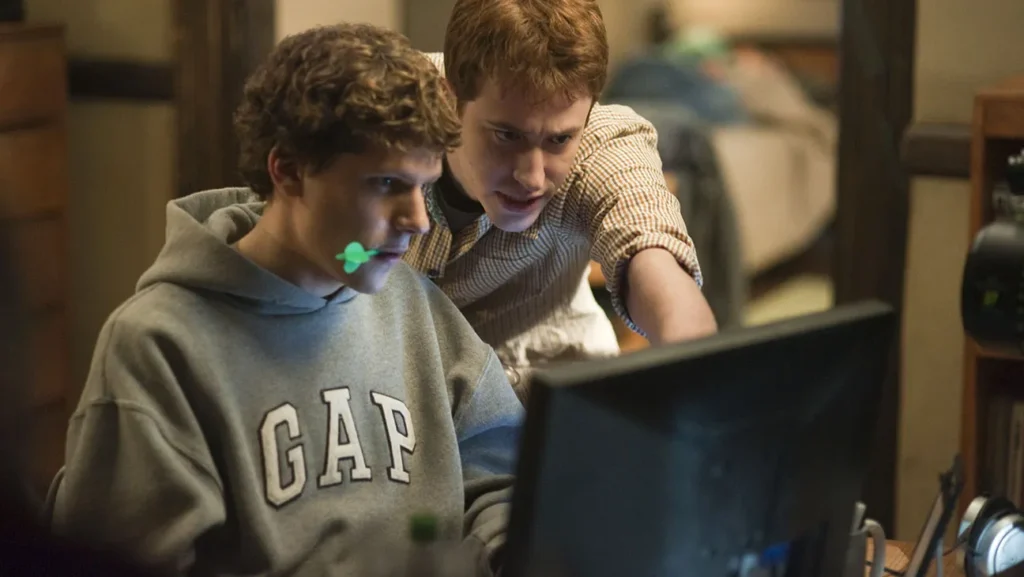
The scene does a lot to establish who Zuckerberg, at least the film’s version of him, is as a person. It sets the tone for many of the decisions he will make throughout the film, and presenting this early on, lets the audience know who Zuckerberg is as a person. The real Mark Zuckerberg came out as saying that his portrayal in the film wasn’t wholly accurate, but the strength of Sorkin’s writing makes the audience believe there is some truth in how the movie has chosen to showcase him. That’s the power of Sorkin’s abilities as a screenwriter, but also the strength of Eisenberg’s performance.
Sorkin’s level of writing is on display during several key scenes, and it’s always in perfect lock step with Fincher’s direction. A biographical drama such as this could lose the audience if it doesn’t flow well, but Fincher’s skills behind the camera are a masterclass of pacing and execution. The Social Network never slows to a crawl and never loses the attention of the audience. From the moment the film opens, Fincher has the viewer right where he wants them, and that only continues as the film moves along.
This is aided by impeccable cinematography courtesy of Jeff Cronenweth, pitch-perfect editing by Angus Wall and Kirk Baxter, and an unconventional, but attention-grabbing score from Trent Reznor and Atticus Ross. It comes as no surprise that the film won Academy Awards for Best Film Editing, Best Cinematography, and Best Score because they’re the cherry on top of the creative prowess that Fincher was displaying as a director. Every creative piece of this film came together in perfect measure.
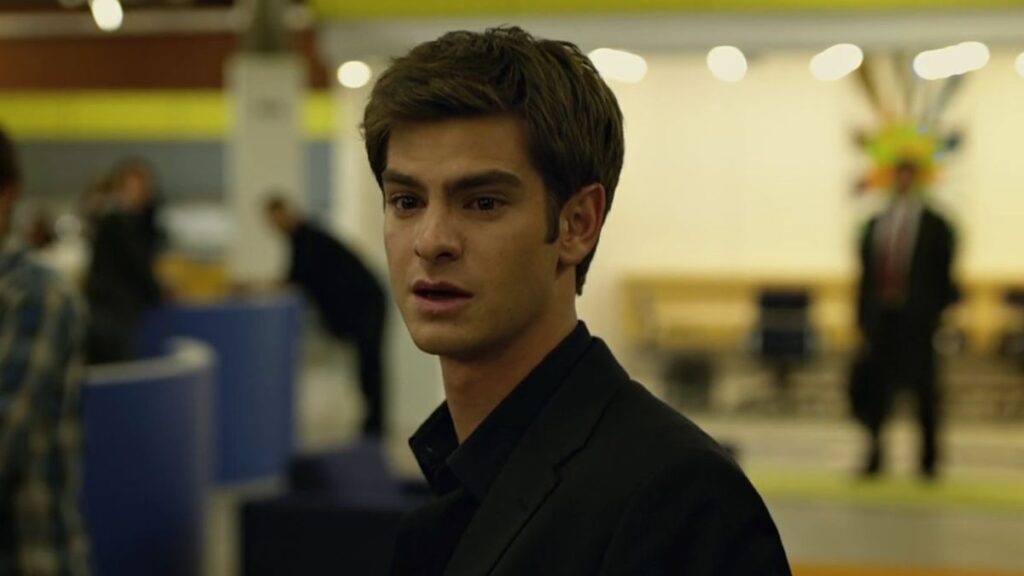
There is also Fincer and Sorkin’s ability to build excitement out of scenes of characters simply talking. One of the highlights of the film sees Zuckerberg, Eduardo, and Christy (Song) meeting Sean Parker (Timberlake) for the first time. As the score by Reznor and Ross pulses in the background, the scene quickly becomes a verbal sparring and eloquently written pissing contest (between Parker and Eduardo) that has all of the tension and suspense of a physical encounter. The viewer is left equal parts impressed and exhausted after it’s all said and done; that’s a testament to Sorkin’s writing of the scene, along with Fincher’s directorial decisions. In addition to this, it’s the actors who bring it all to life with a great sense of confidence and ease.
Sorkin’s writing and Fincher’s direction wouldn’t be fully realized with the game performances of the film’s cast. Eisenberg, who at the time was an actor just below the radar thanks to turns in Zombieland and Adventureland, found the role that made him an actor to be watched as Zuckerberg. It’s a difficult character to bring to life because the movie’s version of him isn’t all that likable, but Eisenberg finds some humanity in him to make the audience not totally turn their back on him.
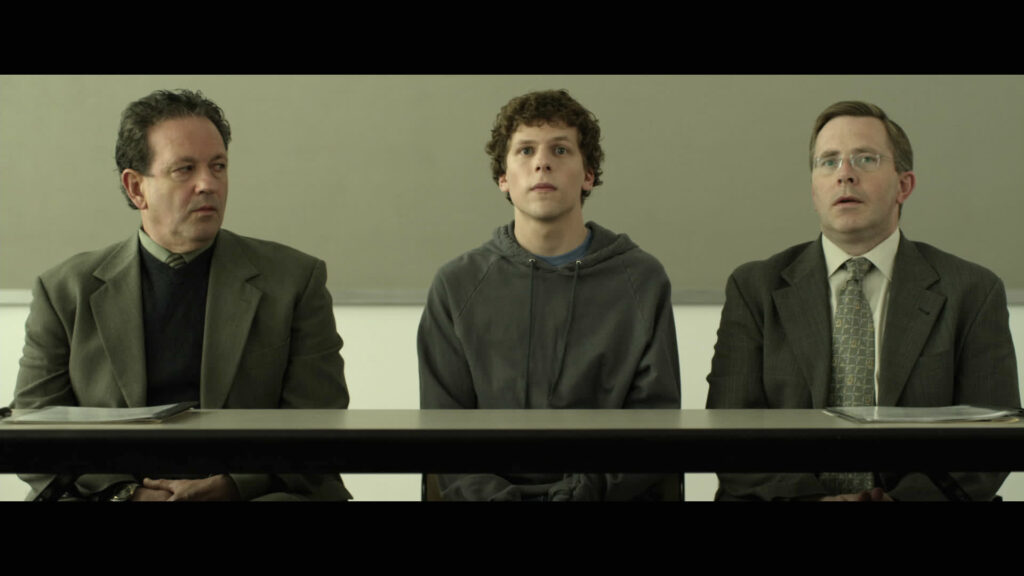
Beyond all the neurosis and the man at the mercy of his high level of intelligence, there is someone who is seemingly lonely and looking for a bit of connection. The movie doesn’t gloss over how he may have messed people over, but somehow Eisenberg imbues him with sympathy. This is no easy task, and this is why his nuanced performance earned him an Oscar nomination.
As Eduardo, Garfield gives what I still consider to be one of the best performances of his career. Somehow, he was nominated for major precursors for his performance (the Golden Globe and SAG Award), but he missed out on a Best Supporting Oscar nomination, which remains a huge snub all these years later. Garfield sells a level of naivety that works for Eduardo early in the film as he uses his considerable funds to help build the website during its humble beginnings.
He portrays a belief in Zuckerberg and their friendship that is believable, and it’s mostly a quiet and understated performance until he begins to suspect that he’s being betrayed and pushed out by someone he considered to be his best friend. It’s a performance with layers, and it leads to an eruption at the Facebook offices that leads to a broken laptop and verbal lashing that is likely still being used for auditions by many young performers breaking into acting.
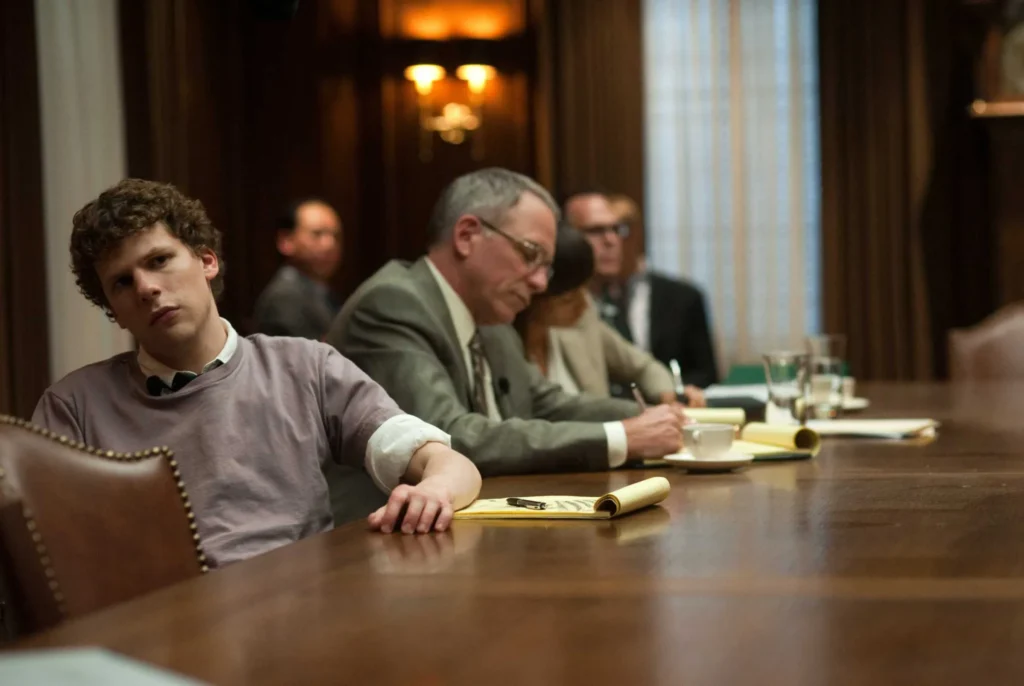
In addition to Garfield, Timberlake also puts his popstar persona to good use by portraying someone with a devilish level of cockiness that is likely a front and mostly all talk. Timberlake has proven more than once that he’s a capable actor, and it’s proven once again here, with some of his moments with Garfield bringing the best out of both of them.
The Social Network was critically and financially successful, going on to gross $224.9 million worldwide on a $40 million budget, as it soon took its success through awards season with eight Academy Award nominations, including Best Picture, Best Director, Best Actor (Eisenberg), Best Adapted Screenplay (Sorkin), Best Original Score, Best Cinematography and Best Film Editing. The movie rightfully took home the award for Sorkin’s brilliant adapted screenplay, and it also showed up for its technical awards in Original Score, Cinematography, and Film Editing, but it has always stung that Fincher and the film didn’t win the top prize of the night.
The King’s Speech won Best Picture at the 83rd Academy Awards, and the film’s director, Tom Hooper, took home the directing honors. While it would not be right to take away the shine from The King’s Speech because it, too, is a strong film, the Academy and its voters had a chance to buck trends and not award a film that felt a bit more “Oscar-baity” when compared to The Social Network. Look at this way: 15 years later, are people dissecting and reaffirming the legacy of The King’s Speech or The Social Network?
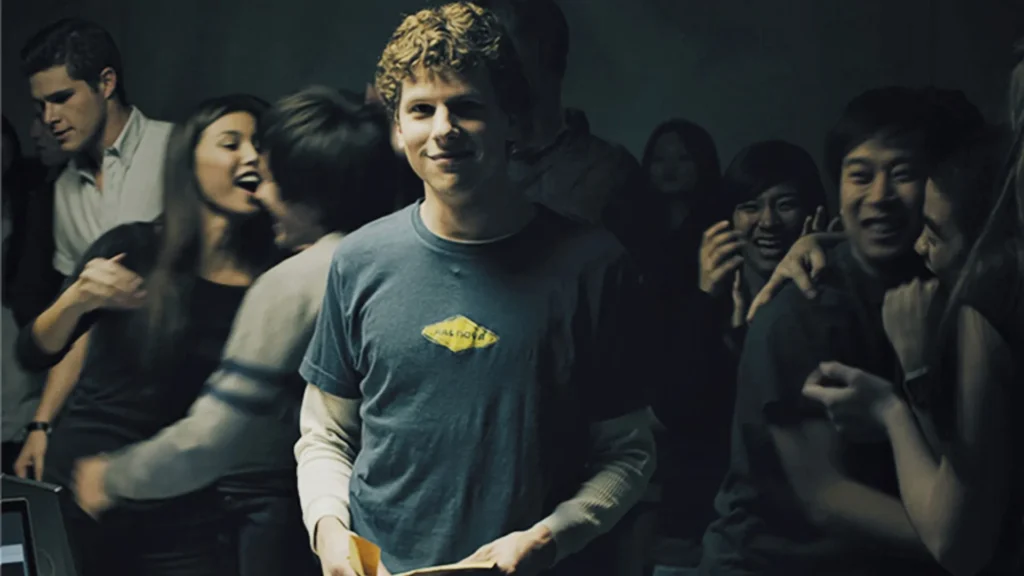
Even without a Best Picture win, The Social Network remains a true cinematic masterpiece of the 21st century. It’s a film that is still discussed in detail 15 years after its release, and it will remain a standard of the craft for many years to come. Many components came together to achieve the greatness of The Social Network, and lovers of all things cinema have benefited from its creation, and that will be a benefit that keeps giving across generations.
For more on Movies, make sure to check back to That Hashtag Show.

